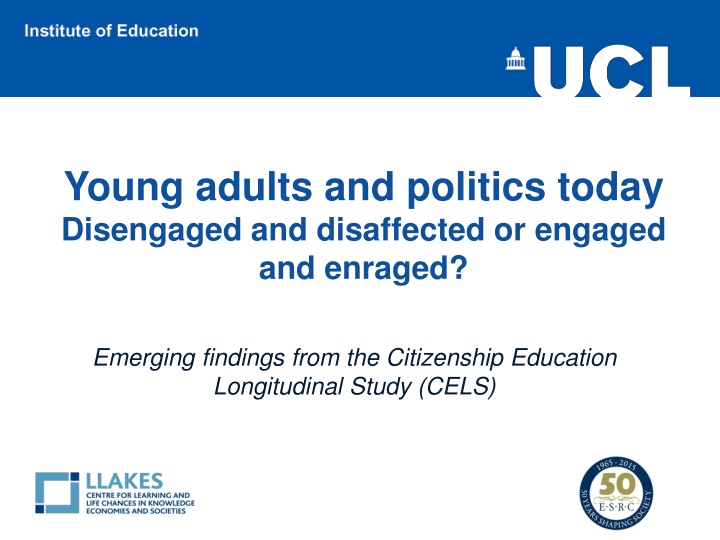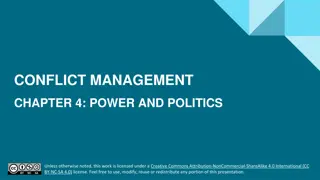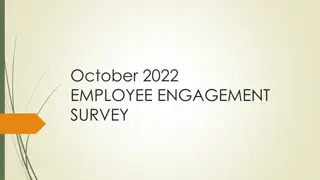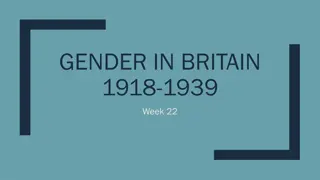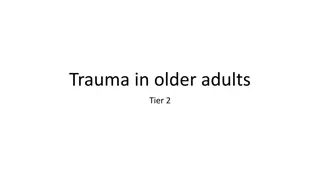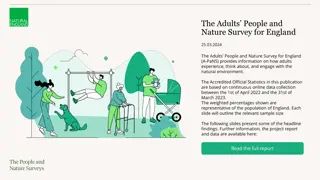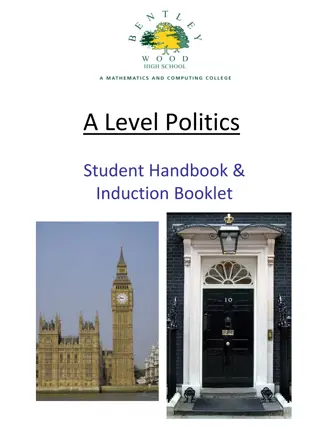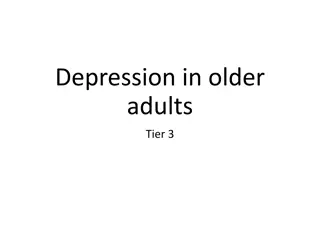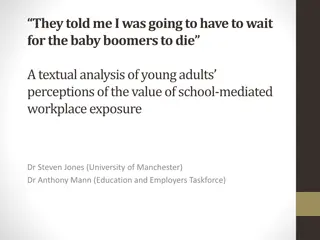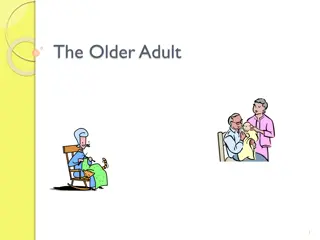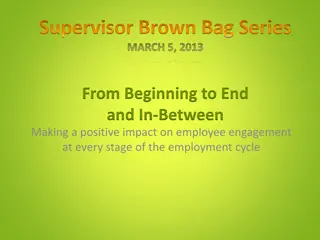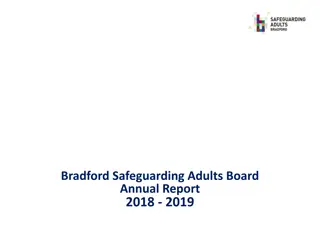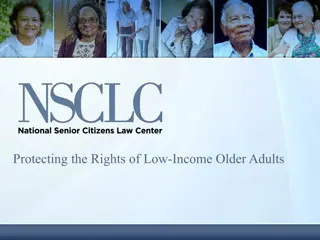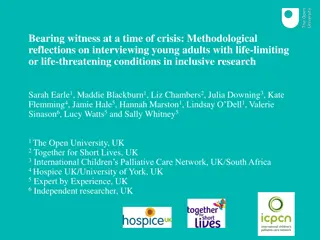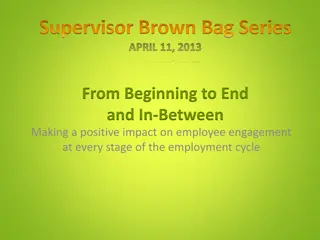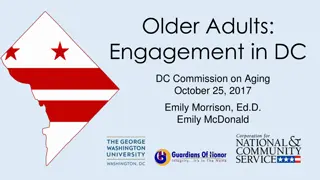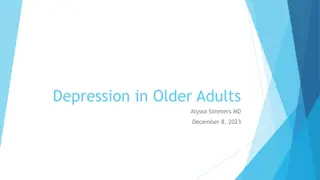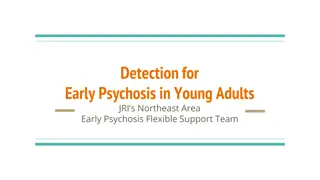Young Adults and Politics: Disengaged or Engaged?
Young adults today show a level of distrust towards politicians yet remain politically engaged, with varying concerns by gender and education. Citizenship education is seen as a positive factor in boosting engagement levels. The potential for change in the next election is promising, with a significant portion of young adults expressing a likelihood to vote. Voting remains the most common form of political engagement among young adults in their 20s, while many also discuss political issues on social networking sites.
Download Presentation

Please find below an Image/Link to download the presentation.
The content on the website is provided AS IS for your information and personal use only. It may not be sold, licensed, or shared on other websites without obtaining consent from the author.If you encounter any issues during the download, it is possible that the publisher has removed the file from their server.
You are allowed to download the files provided on this website for personal or commercial use, subject to the condition that they are used lawfully. All files are the property of their respective owners.
The content on the website is provided AS IS for your information and personal use only. It may not be sold, licensed, or shared on other websites without obtaining consent from the author.
E N D
Presentation Transcript
Young adults and politics today Disengaged and disaffected or engaged and enraged? Emerging findings from the Citizenship Education Longitudinal Study (CELS)
Key messages Young adults are very distrustful of politicians and vote less than older generations. But most are still politically engaged and do intend to vote at the next election. Their political concerns are often different from older adults and they vary by gender and education. Political engagement grows rapidly from the mid-teens on. Citizenship education can boost engagement and should continue after 16.
Turnout among adults in GB Youth turnout Sources: Ipsos-Mori (2010) and Eurobarometer (201)
Potential to change this in next election? 25% not likely 50% very likely to vote 25% fairly likely Source: 2025 young people aged 22-29 in England, Scotland and Wales, June-July 2014
The ballot box still matters to young people It is every adult s duty to vote in elections 50% Source: 2025 young people aged 22-29 in England, Scotland and Wales, June-July 2014
For young adults in their 20s, voting is still the most common type of political engagement Have you ever.... (% yes) 48% Voted in a local or national election 43% Signed a petition 18% Joined/ followed a campaign group on social media 15% Boycotted a business, product or brand 15% Followed or 'Liked' a politician on social media 12% Contacted a local councillor or MP 10% Taken part in a public demonstration /protest 3% Used a social network site to start a campaign Source: 2025 young people aged 22-29 in England, Scotland and Wales, June-July 2014
Many are also interested in politics and talk about political issues with friends and family How often do you use social networking sites to do the following? (%) Post links to political stories or articles 46 51 'Like' or repost political/ civic material 55 42 Post your own political/ civic comments 55 41 Once a month or more Never
What issues are young adults concerned about? What is the single most important issue facing the country at the moment? Top 5 responses from young adults compared with adults over 35 (%) 31 29 18 18 12 7 6 3 2 1 Immigration Unemployment State of the economy NHS Terrorism CELS cohort (Age 23) Over 35s (BES)
Young women more concerned about immigration and the NHS Males 20.1% 16.5% Females 14.0% 9.3% 8.7% 4.4% Immigration State of the economy NHS
Graduates more concerned about the state of the economy, NHS. Early school leavers more concerned about immigration and unemployment. 23.5% 21.1% 16.0% 15.5% 12.3% 10.0% 6.9% 5.4% 5.3% 2.5% Immigration Unemployment State of the economy NHS War against terrorism Up to lower secondary (Level 2) Degree (Level 5)
Young adults in deprived areas + disadvantaged backgrounds not just concerned about unemployment If a politician knocked on your door tomorrow, what would you tell them they should do to help improve life in your community? Practical skills, better qualifications, and routes into work Safer communities More activities for children and young people Services and centres that could bring communities together
Building local communities = the key to re-building trust among this group? And if I do see even the slightest of change, then I would consider voting, because then I know there s somebody actually legitimately trying to help people around my area (White British male, 23, no qualifications, long-term unemployed)
Adulthood Adolescence Growing up political today
As young people grow up, political trust declines markedly How much do you trust politicians? (%) 83 79 76 70 60 51 23 19 16 15 13 9 Age 12 Age 14 Little/ no trust Age 16 Age 18 Age 20 Age 23 Quite a lot/ Complete trust
By contrast, interest in voting and in politics increase 53 50 42 35 29 19 14 14 Age 12 Age 14 Age 16 Age 18 Age 20 Age 23 In the future I will vote in future elections I am very interested in politics People like me can have a real influence on government if they get involved
Growing interest, but also a growing engagement gap In the future, will you vote in general elections? (% definitely plan to do this) 72 72 54 44 26 34 31 13 9 Age 12 Age 16 Age 20 Age 23 Up to lower secondary Upper secondary Degree
At age 12, interest in politics is actually higher among students who end up leaving school at 16. But the engagement gap emerges by age 16. "I am very interested in politics" (% agree & strongly agree) 39 36 20 14 13 13 6 2 Age 12 Age 16 Age 20 Age 23 Up to lower secondary Upper secondary Degree
Can citizenship education boost political engagement among young adults? Positive attitudes towards civic and political engagement More likely to believe that they can influence government and effect political change
Most effective when Citizenshipclasses of 45 minutes per week Teachers have hands-on role in lesson planning Learning is formally assessed (e.g. through a GCSE examination) Citizenship provided regularly throughout the school experiences.
Opportunities to put citizenship into practice Learning by doing E.g. School councils, mock elections, debating teams But also other means
Summary Voting remains a important means of political engagement Young people get more interested in politics as they get older and make the transition to adulthood Young people and young adults = not a homogenous group Need to respond to the differences between young citizens, as well as the differences between older and younger voters
Policy implications 1. Strengthen citizenship education in schools, and ensure that it is continued in post-16 education and training settings. 2. Continue to support opportunities for learning about citizenship through real life practice and active citizenship .
Not just up to schools to educate citizens Political parties - address issues that are important to young adults Civil society organisations For example, get out the vote campaigns (Effective) use of social media Aim at families, not just young adults
More information Research brief More findings More about the data sources LLAKES website (www.llakes.ac.uk)
